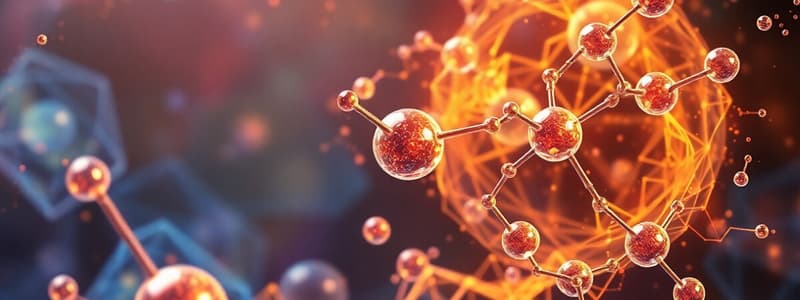Podcast
Questions and Answers
Which analytical technique measures the current response as a function of applied potential?
Which analytical technique measures the current response as a function of applied potential?
What is the primary purpose of High-Performance Liquid Chromatography (HPLC)?
What is the primary purpose of High-Performance Liquid Chromatography (HPLC)?
Which term describes the closeness of repeated measurements to each other?
Which term describes the closeness of repeated measurements to each other?
How can quality control measures affect analytical chemistry results?
How can quality control measures affect analytical chemistry results?
Signup and view all the answers
In what way are analytical techniques important in the context of inorganic chemistry?
In what way are analytical techniques important in the context of inorganic chemistry?
Signup and view all the answers
What type of compounds does inorganic chemistry primarily focus on?
What type of compounds does inorganic chemistry primarily focus on?
Signup and view all the answers
Which of the following properties is NOT considered fundamental in atomic structure?
Which of the following properties is NOT considered fundamental in atomic structure?
Signup and view all the answers
What is a key focus of coordination chemistry?
What is a key focus of coordination chemistry?
Signup and view all the answers
Which analytical technique is specifically used to measure the absorption of light by atoms?
Which analytical technique is specifically used to measure the absorption of light by atoms?
Signup and view all the answers
Which type of bonding is mainly explained by molecular orbital theory?
Which type of bonding is mainly explained by molecular orbital theory?
Signup and view all the answers
What is a fundamental application of analytical chemistry?
What is a fundamental application of analytical chemistry?
Signup and view all the answers
Which type of spectroscopy analyzes the vibrational modes of molecules?
Which type of spectroscopy analyzes the vibrational modes of molecules?
Signup and view all the answers
In the periodic table, what mainly enables the prediction of element properties?
In the periodic table, what mainly enables the prediction of element properties?
Signup and view all the answers
Study Notes
Introduction to Inorganic Chemistry
- Inorganic chemistry focuses on the synthesis, properties, and reactivity of inorganic compounds, excluding primarily organic compounds.
- This branch of chemistry encompasses a vast array of substances, including metals, nonmetals, minerals, and compounds containing elements not commonly associated with organic compounds.
- It plays a crucial role in various fields, from materials science to environmental science.
Fundamental Concepts in Inorganic Chemistry
- Atomic Structure: Understanding the arrangement of electrons within atoms is fundamental. Electronegativity, ionization energy, and electron affinity are key properties.
- Bonding Theories: Theories like valence bond theory and molecular orbital theory explain how atoms combine to form molecules, emphasizing the nature and types of chemical bonds (ionic, covalent, metallic).
- Coordination Chemistry: Studying transition metal complexes and their properties is crucial. Ligands, coordination numbers, and isomerism are central to understanding coordination chemistry.
- Periodicity: The periodic table organizes elements based on their electronic configurations, enabling prediction of element properties and trends within families.
Introduction to Analytical Chemistry
- Analytical chemistry is the science of separating, identifying, and quantifying chemical components.
- It involves techniques for identifying and quantifying elements and molecules in a sample, and plays a vital role in environmental monitoring, forensic science, materials science, and medicine.
- Various analytical techniques are used, requiring careful selection and application based on the sample's characteristics.
Analytical Techniques in Analytical Chemistry
- Spectroscopic Techniques:
- UV-Vis Spectroscopy: Measures the absorption of ultraviolet and visible light by molecules and atoms. It is used for qualitative and quantitative analysis in various applications.
- Infrared (IR) Spectroscopy: Analyzes the vibrational modes of molecules to identify functional groups.
- Atomic Spectroscopy: Techniques like atomic absorption and emission spectroscopy measure the light absorption or emission by atoms to determine elemental composition.
- Chromatographic Techniques:
- Gas Chromatography (GC): Separates volatile compounds in a sample based on their different boiling points.
- High-Performance Liquid Chromatography (HPLC): Separates compounds based on their interactions with stationary and mobile phases. This is crucial for identifying and quantifying components in complex mixtures.
- Electrochemical Techniques:
- Potentiometry: Measures the potential difference between two electrodes in a solution.
- Coulometry: Measures the amount of charge passed during an electrochemical reaction - useful for identifying and quantifying elements.
- Voltammetry: Measures the current response as a function of applied potential or time.
- Other techniques:
- Titrations: Quantitative analysis based on the reaction of a known solution with the analyte.
- Gravimetry: Determining the mass of a substance based on a chemical reaction or change in state.
Importance of Accuracy and Precision in Analytical Chemistry
- Accuracy: Closeness of experimental data to the true value.
- Precision: Closeness of repeated measurements to each other.
- Reliability of results depends on both.
- Methods for minimizing errors and sources of errors in analytical procedures are crucial.
- Quality control measures and standards are essential to ensure reliable analytical results.
Interplay Between Inorganic and Analytical Chemistry
- Analytical techniques are used to characterize the properties and structures of inorganic compounds.
- Synthesis of new inorganic compounds frequently requires analytical techniques to verify purity, composition, and structure.
- Example: Analytical methods are critical for determining the stoichiometry and structure of metal complexes.
Studying That Suits You
Use AI to generate personalized quizzes and flashcards to suit your learning preferences.
Description
This quiz explores the fundamentals of inorganic chemistry, including atomic structure, bonding theories, and coordination chemistry. It covers the synthesis, properties, and reactivity of inorganic compounds, essential for understanding various scientific fields. Test your knowledge on key concepts and theories in this vital branch of chemistry.




